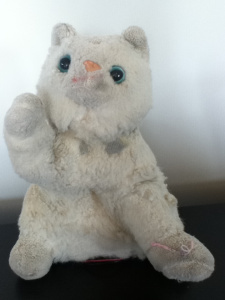The Then and the Now.
Dead Cat
Some years ago, I had to attend a series of chem. labs to complete the practical requirement of my extramural course: Organic Chemistry:101.Yes, you read that correctly—Chemistry! Let me tell you, it takes a special kind of stupid to do any kind of Chemistry by correspondence. At the time I was raising two children on my own, working a part-time job, and furthering my education with extramural study in Chemistry, Biology, Maths and Physics. That’s no walk in the park. I look back now and wonder how the hell I ever did it. It just shows that with a good belt of determination, and just the right mix of insanity, you too can engineer your own near-burnout experience. (At one point, I found myself automatically reaching barehanded to catch dripping sulphuric acid so it wouldn’t mark the lab bench. It was about then that I decided chemistry wasn’t for me – but I digress)
Fortunately, I still had enough youth on my side to get me through the pain. Unfortunately, that youth didn’t always serve me so well.
So there I was, on campus, living the dream of the returning student, soaking up university life and adding another string to my bow so I could leap up that corporate ladder, when one evening, after one particularly gruelling day of labs, I found myself sitting in the common room enjoying the company of my peers. Having left school the nanosecond I turned sixteen, I admit to being somewhat overwhelmed, perhaps even a little intimidated, by the academically imbued company I’d found myself in—until, that is, the moment when one of these geniuses pipes up and says, “Wanna hear a joke?”
Of course, the immediate response from the entire room is, “Yeah, go on, tell us,” and we all settle in for the impending chuckles.
So he starts, “What do you get when you throw a mental retard into—”
“—excuse me,” I interrupt, hand in the air like a kid in kindergarten, “but I think I should warn you that I have an intellectually handicapped daughter.”
A stinging silence stretches out across the room. The temperature drops a couple of degrees. The atmosphere crackles with discomfort and the almost indiscernible sounds of non-breathing. Sly glances flit around.
Otherwise, nothing—maybe crickets.
So the guy continues with the joke.
As the single voice of dissension—I swallow back the lump in my throat and look around at my fellow academics for support. Heads go down. A throat is cleared. A few uncomfortable sideways glances flick my way.
I’m mortified, humiliated. My heart flips into double-time while my face blooms scarlet.
So, you know what I did?
Nothing.
That’s right. I sat there feeling a thousand tiny needles prickling my skin as the pain of fifteen years of battling crappy attitudes and off-colour jokes, and imbeciles who never think comes flooding back to haunt me. And I sit there doing and saying nothing. There might have been a few pitying looks from those in my class. A couple of people might have been going to speak. But they didn’t.
Not one person came to my defence. Tears burned in my lower lids. I blinked them back. I had no intention of giving anyone the satisfaction of seeing me cry.
After a suitable measure of time, people relaxed, the conversation picked up as if nothing had happened, and I scuttled out of there as if I’d done something inexcusable.
I look back now and wonder what the hell was going on in my head. If this happened now, I’d throttle the guy. I’d tell him exactly what I thought of his puerile joke and his twisted sense of humour. Then at the first possible moment, I’d lay a complaint against him with the university. I’d have his sorry ass kicked so hard, he’d have graduated before he came down. He came there to learn—that’s one lesson he’d take away that he hadn’t expected.
Then I’d walk out with my head in the air.
And you know what? I am almost one zillion percent sure that every person in that common room would have told the guy what they thought, and walked with me.
So what’s the difference between between then and now? I could say that maturity has lent a hand—which is probably true.
I could say that I’m no longer intimidated by people with letters after their names and certificates on their walls—which is also true. I could say that I’m not worried what people think, that I accept that I’m weird, and that rather than bother me, I embrace it. Yeah, maybe that’s stretching it.
The truth is these days I have a swagger I didn’t used to have. I wear my role as the nurse, carer, advocate, and mother of a disabled Girl with pride. I have a level of surety about my place in the world that I didn’t have back then. It’s made me care less about what people think, and care more about what I think. But that’s only part of the picture.
It’s not just my own acceptance of what I am or who I am. It’s acceptance that’s come from my relationship with my Girl. It’s a growing acceptance of me and my Girl by our friends, by our acquaintances, by all those we come across in day-to-day life—both online and off; by the community and by society as a whole.
Once upon a time, I felt as though I was defined by my girl; that because she was “damaged” that I, by association and by blood, was also looked upon as “damaged.”
These days, I see myself quite differently. These days, I’m defined by my girl, but not as a victim. I’m the mother of a disabled young person. I have an enormous responsibility. It’s my responsibility for her life, for her freedom, for her dignity. She cannot control events in her life; she cannot make decisions that affect her life. That’s my job. Hell, hasn’t she got enough battles to fight?
So how did I undergo such a shift—such a mind-flip? How did I go from meek, unassuming broken Me to fist-fighting, desk-pounding, determined-to-make-my-Girl’s-life-the-best-it-can-be Me?
Lemme tell you, it’s taken some time. But I’ve been blessed.
I’ve had (and still have) friends who have trodden these very same boards, and lost their young ones way too soon. I have friends I can call on in moments of terror, or stress, or worry, or horror, or anguish. I’ve chosen my “Warrior Friends” because they’re smart and knowing and wise, but never short of a good bout of outraged indignation on my behalf at the slightest provocation.
I’ve been blessed to know the beautiful young people from my Girl’s program. These are young people society sometimes still sees as the “damaged” and the “broken.” But I’ve seen their strength. I’ve seen their courage and their love. These are young people who have friends, and loves, and lives, and sorrows and everything you and I have (or maybe don’t have). Yes, they’re different. Yes, they have challenges that you and I would crumble under—and yet, these are people who are happy and accepting of things most people wouldn’t put up with in a million years.
I’ve been privileged to know their teachers—people who show the utmost respect for those in their care. They come gladly to work with people who are physically challenged and frail and intellectually different. These teachers look upon their students as friends, as peers, as colleagues. There’s an atmosphere of mutual respect; of love, and determination to make every day count—to share in their joys and their sorrows and their everyday achievements and successes—regardless how small.
I have had the benefit of all these wonderful, fabulous, positive people in my life. I owe them more than they could ever know. And I thank them.
I look back now over my life, and realize without hesitation—that the only person within this post who was ever truly broken …
… was the guy who told that joke.






